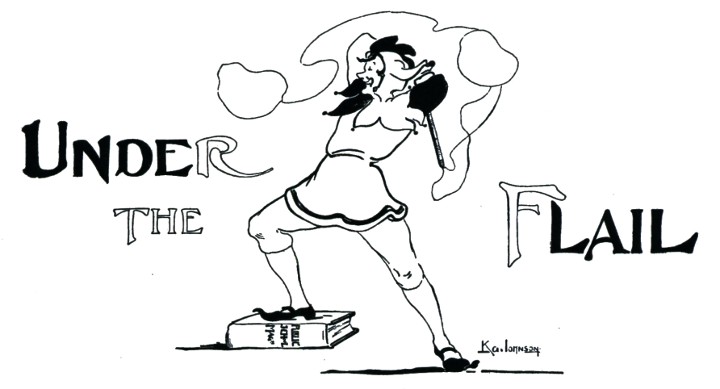Public School Magazine, December 1901

FROM the fact that the organ-grinder whose beat takes him underneath my window has added “Christians awake” to his repertoire, to the exclusion of “When Father backs a winner,” I gather that Christmas is once more upon us. The air is full of poetry and romantic reflections. It is just a year, for instance, since Under the Flail started in these columns. This is a very gratifying thought. It means that twelve times at any rate during the past year I have done a solid spell of work. And how many of us are there who can say as much? Few indeed. Another gratifying thought—but I will spare my readers the rest. I wish to speak of Christmas customs at the Public Schools.
When I was at school and sub-edited the magazine, I received from a perfect stranger (on a half-sheet of notepaper rather the worse for wear) a request that I would furnish him with full details of the Christmas customs at our shrine of learning. A committee of four sat on that letter. We each invented a custom for the benefit of our correspondent. My own, if I remember rightly, was a vivid account of the annual snow-ball fight between Masters and Sixth Form, a fine piece of descriptive writing. Whether the information suited our correspondent I do not know. I never saw his article in print.
Of genuine Christmas customs I can only recall one, and that one peculiar to a certain Form. On the last day but one of the term some two-thirds of the Form used to get a half-holiday for attending choir-practices and the like. This half-holiday was wisely employed in the following manner. There was a long pole which was used for opening and shutting the windows of the Form-room. To place this against the outside of the door and knock sharply was the first move. “Come in,” said the Master. No reply. “Smith, go and see who’s at the door.” Smith, mercifully prepared for what was going to happen, took up the position in which the pole would be least likely to brain him, and flung wide the gates. This was act one. Some ten minutes afterwards there would be another knock. This time the Master would be prepared. Creeping stealthily to the doer he would open it carefully inch by inch. His smile of triumph generally faded when he caught sight of an amazed youth watching his manœuvres with the deepest interest from the passage outside. “Please, sir, can I come in and fetch a book.” “Foiled,” muttered the Master. The next time the pole would be there again, and so on. It was a beautifully scientific game. There were, of course, great risks attached. It was not easy to get far enough away after knocking to be able to establish a sound alibi. But then what is any game without a certain amount of risk? The player’s greatest triumph came when the Master began to skim through the passages and glare through keyholes and jump on to window-sills. When this occurred it was felt advisable to stop and rest on one’s laurels till the following Christmas.
Serenading one’s Form Master is another custom which might well be more common than it is. I have done it, and I can vouch for the fact that it is replete with excitement. We only did it twice. The first year everything went splendidly. There were four of us. Three sang, while the fourth played fitfully on a comb. “Good King Wenceslas” elicited frantic rappings on the window, and we were gradually getting near the right key in a spirited performance of hymn sixty, when a click at the back-door told us we were being out-flanked. We retreated in good order without casualties. In the following year we were unfortunate. The school tenor came with us, with strict instructions to confine himself to the penny whistle. But, carried away by the excitement of the moment, he burst into song, and his voice was, of course, recognised. A sad pity, for it put an end to what might have become a tradition.
Jack Point.
 Madame Eulalie’s Rare Plums
Madame Eulalie’s Rare Plums